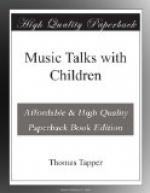Not only did he think of it and write it on the battlefield, but at all times there seemed to come to him more and more wisdom from it. And he tells us this same thought over and over again in different words. Sometimes it leads him to say very droll things; for instance:
“Have you any sense in your head? Yes. Why do you not make use of it then? For if this does its part, for what more can you wish?"[57] Then, a very good thought which we frequently hear:
“Your manners will very much depend upon what you frequently think."[58] There are many others, but these show us that the meaning of his mother’s words went deep, teaching that not action must be guarded but the thought which gives rise to action. Now, what can be the value of speaking about the Roman lady? Let us see.
In music, the tones are made either by the hands or by the voice. And to make a tone is to do something. This doing something is an action, and action comes from thought. No music, then, can be made unless it be made by thinking. And the right playing of good music must come from the right thinking of good thoughts. It may be that you will hear some one say that to think good thoughts is not needed in making good music. Never believe it! Bad thought never made anything good, and never will because it never can. In the very first days you must learn, that good things of all kinds come from good thoughts, because they can come from nothing else.
Here, then, is the second truth of this Talk:
Good music being the fruit of good thought can be played rightly only by one who thinks good thoughts.
This leads us to another matter. First, let us see if everything is clear. True music is written out of good thought; hence, when we begin to study music we are really becoming pupils of good thought. We are learning the thoughts good men have had, trying to feel their truth and meaning, and from them learning to have our own thoughts not only good but constantly better and better. This now seems simple and necessary. We see that if we would faithfully study a composer’s work it must be our principal aim to get into his heart. Then everything will be clear to us.
But we can never find our way to the heart of another until we have first found our way somewhere else. Where, do you think? To our own hearts, being willing to be severe with ourselves; not to be deceitful in our own eyes; not to guard the outer act, but the inner thought; not to study nor to be what seems, but what is.[59] This may seem a long and roundabout way of learning to play music, but it is the honest, straightforward way of going to the great masters whom we wish to know.
In one of the books of the Greek general, Xenophon,[60] Socrates is made to say that men do nothing without fire; and quite in the same way we may learn nothing of each other, especially of those greater than ourselves, without thought; which should be pure, strong, inquiring, and kind. With this we may do all.




